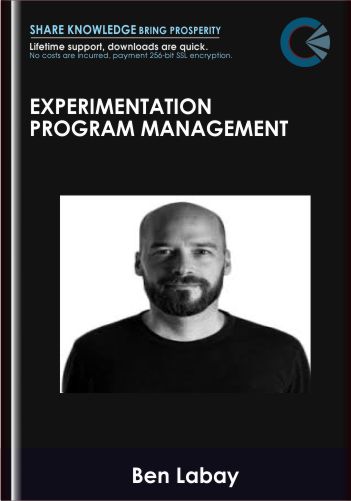$990.00 Original price was: $990.00.$245.00Current price is: $245.00.
Experimentation Program Management – ConversionXL, Ben Labay… To consistently innovate, your organization must promote a culture of experimentation, and make experimentation an integral part of every day’s work.
 Purchase this course you will earn 245 Points worth of $24.50
Purchase this course you will earn 245 Points worth of $24.50Elevate your skills with the Experimentation Program Management – ConversionXL, Ben Labay course, available for just $990.00 Original price was: $990.00.$245.00Current price is: $245.00. on Utralist.com! Browse our curated selection of over 60,000 downloadable digital courses across diverse Business and Sales. Benefit from expert-led, self-paced instruction and save over 80%. Start learning smarter today!
Experimentation Program Management – ConversionXL, Ben Labay
 Experimentation programs are focused on developing an experimentation culture that supports running continuous research and testing efforts in order to decrease innovation risk and improve business and customer goals.
Experimentation programs are focused on developing an experimentation culture that supports running continuous research and testing efforts in order to decrease innovation risk and improve business and customer goals.
To consistently innovate, your organization must promote a culture of experimentation, and make experimentation an integral part of every day’s work.
However, the practice of experimentation can go way beyond optimizing websites. That is why it’s important to learn the frameworks, tools and rituals that can help you and others in your organization embrace experimentation.
Introduction video (5 minutes)
What are the four pillars of an experimentation program?
This course is essential for you if…
- Buy-in from leadership
- No measurement of key metrics and KPIs
- No development or data resources for the testing program
- Even successful tests aren’t implemented
- Poor ideas or test quality
- Low test velocity
- Affecting change in your organization
These struggles are addressed by better program management. Understanding the principles and tools of experimentation program management will make it more effective, and fun. This will help you elevate your program and your career.
After taking this course you will…
- Clearly understand the pillars of experimentation programs and how to scale them to your needs.
- Have the program management tools to help manage the tension between risk and reward, between complexity and business objectives.
- Evaluate the program needs according to business goals and expected outcomes with the right set of questions.
- Communicate the outcomes more effectively to increase engagement from broader team.
Your course curriculum
EXPERIMENTATION PROGRAM MANAGEMENT
You are already convinced…but is your boss? Is your leadership bought into CRO and experimentation? This lesson speaks to the WHY, not the what or the how, so you have the context and language to elevate experimentation within your career and your organization.
Topics covered:
- Be able to make a strategic case for experimentation (from a CMO/CPO vs CEO perspective)
- Understand the limitations of data and how experimentation ‘data’ is different
- Contextualize experimentation by understanding it’s history, differentiation from testing and CRO, and it’s goals, benefits, and principles
This is the framework of the operating system. It provides the language we can commonly use to help translate all the different components into how and where it can work in your organization.
Topics covered:
- Get an overview of the experimentation operating system
- Understand the four stages and three flywheels of the experimentation operating system
- Understand the terms ‘artifacts’ and ‘rituals’ with regards to the system
If we’re all playing a game, let’s make sure we know the rules. This is the first and most fundamental phase of the experimentation operating system. It orients the program to make change that matters, that we care about.
Topics covered:
- Know what strategic frameworks help to integrate the program into the business growth model and strategy
- Know what tools help to assess the problem(s) (aka ‘top-down’ prioritization)
- Learn what rituals and activities and support the alignment of the program to the core business objectives and customer problems
Process and Planning is the systems to accelerate accessibility, trust, and velocity within an experimentation program. This covers much of the traditional and common project and program management components such as roadmapping, data tracking, prioritization tools.
Topics covered:
- Learn the different tools to help prioritize then roadmap solutions
- Understand the different program and people structures within modern experimentation and CRO programs
- Learn a way to roadmap and swimlane with solution mapping workshops
You already have goal and metric maps, you have the research and prioritization tools….In this section of Experimentation program management, we’re talking about the workflow tools and rituals to use as a systems approach to running tests.
Topics covered:
- Know what workflow and documentation tools you need to facilitate proper test execution
- Understand phase gating as part of experimentation workflow management
Topics covered:
- Know what tools help to increase ease and velocity of decisions from test results
- Know the implementation implications to help plan ahead of time
- Understand the importance of communication and the tools available
7. Scaling & Program Metrics
Topics covered:
- Know where you can start programs, and the principles of scaling and resourcing
- Understand the purpose, categories, and examples of experimentation program audits
- Understand the primary metric taxonomy and where program metrics fit in
Are you interested in? Experimentation Program Management – ConversionXL, Ben Labay Download, experimentation program management, experimentation program management animal, experimentation program management and, experimentation program management and circuit, experimentation program management analyst.
Purchasing Experimentation Program Management – ConversionXL, Ben Labay course now, You can get it with the LIFETIME SUPPORT and UNLIMITED DOWNLOAD.
Cultivate continuous growth with the Experimentation Program Management – ConversionXL, Ben Labay course at Utralist.com! Unlock lifetime access to premium digital content, meticulously designed for both career advancement and personal enrichment.
- Lifetime Access: Enjoy limitless access to your purchased courses.
- Exceptional Value: Benefit from savings up to 80% on high-quality courses.
- Secure Transactions: Your payments are always safe and protected.
- Practical Application: Gain real-world skills applicable to your goals.
- Instant Accessibility: Begin your learning journey immediately after buying.
- Device Compatible: Access your courses seamlessly on any device.
Transform your potential with Utralist.com!
You may also like…
Uncategorized
= 113 Points
Related products
Business and Sales
Customer Storytelling and Proof – ConversionXL, Jordan Greene
= 365 Points
Business and Sales
= 365 Points
Business and Sales
= 65 Points
Business and Sales
= 365 Points
Business and Sales
= 85 Points
Business and Sales
= 18 Points
Business and Sales
= 24 Points
Business and Sales
= 365 Points













